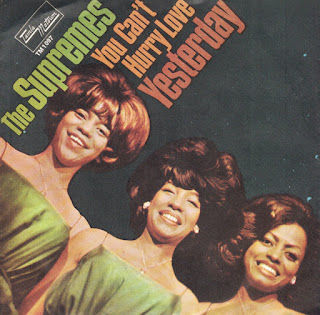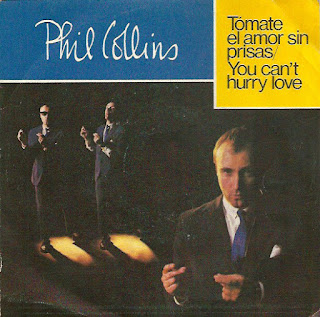THE SUPREMES / PHIL COLLINS - YOU CAN’T HURRY LOVE
Publicació: 25 de juliol de 1966
Llistes: Regne Unit: #3 EUA: #1 (2 setmanes)
"You Can't Hurry Love" és una cançó del 1966 interpretada per les Supremes, llançada sota el segell Motown com el segon single del seu àlbum "The Supremes A' Go-Go". Produïda i escrita pel reconegut equip de Motown Holland-Dozier-Holland, la cançó és celebrada com un dels llançaments més destacats de les Supremes i de Motown. Billboard la va elogiar com la cançó més emocionant del grup fins a la data, destacant les seves veus de primera categoria i l'acompanyament instrumental excepcional.
Eddie Holland va acunyar el títol de "You Can't Hurry Love" per ajustar-se a la melodia de Brian Holland. Lamont Dozier en va recordar els orígens en una entrevista per "1000 UK #1 Hits" de Jon Kutner i Spencer Leigh, assenyalant que inicialment l'equip tenia com a objectiu remodelar "Come See About Me", però van acabar transformant-lo en "You Can't Hurry Love". La seva intenció era infondre a la cançó un toc de gòspel, cosa que finalment va donar forma al seu so distintiu.
La versió de Phil Collins va assolir un èxit significatiu, arribant al número 10 del Billboard Hot 100 als Estats Units i encapçalant la UK Singles Chart a finals de 1982. Aquesta versió va destacar com a tema principal de la pel·lícula de 1988 titulada "Buster", la qual Collins va protagonitzar. La línia de baix de la versió de Collins va inspirar la línia de baix d'Andy Rourke a la cançó de The Smiths "This Charming Man".
Phil Collins va demostrar la seva admiració per Motown inscrivint "Motown, us saludem" a la coberta del seu àlbum "Hello, I Must Be Going", que incloïa la seva versió de "You Can't Hurry Love". El videoclip acompanyant de la versió de Collins va retre homenatge als Supremes, mostrant tres Phil Collins en línia, recordant la formació i coreografia icòniques de les Supremes.
"You Can't Hurry Love" va marcar l'inici d'una nova etapa d'èxit per les Supremes, amb una segona sèrie consecutiva de números 1 a les llistes americanes. Després del seu èxit inicial a finals de 1964 i al llarg de 1965 amb cinc singles consecutius número 1, les Supremes van iniciar una altra ratxa el 1966. Començant amb "You Can't Hurry Love", van aconseguir quatre número 1 més consecutius al Billboard Hot 100.
THE SUPREMES / PHIL COLLINS - YOU CAN’T HURRY LOVE
Released : July 25, 1966
Charted: UK: #3 US: #1 (2 weeks)
"You Can't Hurry Love" is a 1966 song by the Supremes, released under the Motown label as the second single from their album "The Supremes A' Go-Go". Produced and written by Motown's renowned team Holland-Dozier-Holland, the song is celebrated as one of the Supremes' and Motown's standout releases. Billboard praised it as the group's most thrilling song to date, highlighting its top-notch vocals and exceptional instrumental backing.
Eddie Holland coined the title for "You Can't Hurry Love" to fit Brian Holland's melody. Lamont Dozier remembered the song's origins in an interview for "1000 UK #1 Hits" by Jon Kutner and Spencer Leigh, noting that the team initially aimed to remodel "Come See About Me" but ended up transforming it into "You Can't Hurry Love". Their goal was to infuse the song with a gospel vibe, which ultimately shaped its distinctive sound.
Phil Collins' cover achieved significant success, reaching number 10 on the US Billboard Hot 100 and topping the UK Singles Chart in late 1982. This version of the song was prominently featured as the main theme for the 1988 film also titled "Buster," in which Collins starred. The bassline from Collins' rendition of "You Can't Hurry Love" inspired Andy Rourke's bassline in The Smiths' song "This Charming Man."
Phil Collins demonstrated his admiration for Motown by inscribing "Motown, we salute you" on the sleeve of his album "Hello, I Must Be Going," which included his cover of "You Can't Hurry Love." The accompanying music video for Collins' version paid homage to The Supremes, featuring three Phil Collinses standing in a line, reminiscent of The Supremes' iconic lineup and choreography.
"You Can't Hurry Love" marked the beginning of another successful run for the Supremes, with a second string of consecutive #1 hits on the American charts. Following their initial success at the end of 1964 and into 1965 with five consecutive #1 singles, the Supremes began another streak in 1966. Starting with "You Can't Hurry Love," they went on to achieve four more consecutive #1 hits on the Billboard Hot 100.













Cap comentari:
Publica un comentari a l'entrada